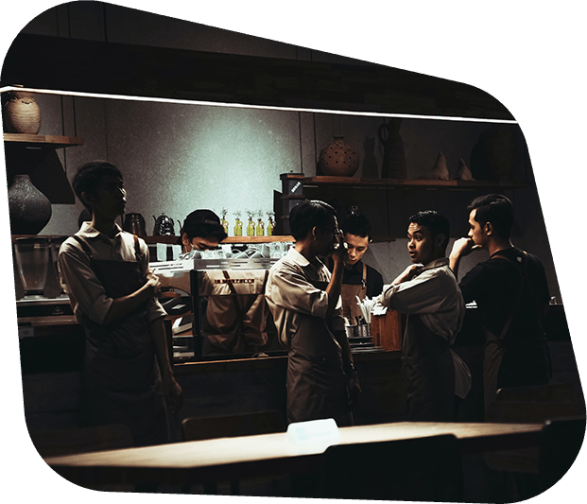This article was made with the help of Paul van Oers (Hotel Management School Maastricht) and Jeroen Oskam (Hotelschool The Hague).
Diversity
The discussion on diversity has nothing to do with the coronavirus crisis, but is very much a current subject. Nowadays diversity is also an important issue in the hospitality sector. Conversations on diversity have led entrepreneurs to want to offer more opportunities to female chefs and employees with a migration background. Diversity ensures more variation in a team and more creativity in a company.


7.

Acceleration of digitalization
Even before COVID-19, a battle of digitalization was taking place in the hospitality industry. The crisis has accelerated digital development even more. Contactless payments, ordering via QR codes, digitized reservation systems, online personalized meals; all examples of digital services that are used today and will be used even more in the future. Employees have to learn how to deal with digital systems in the kitchen, in the reservation and in the service. Digital illiterate people won’t be employed anytime soon. In addition, digitalization might bring an end to tipping, which is usually done in cash. Tips have always been a nice bonus on top of their salary for many employees.
6.

Changing guests = changing employees
The type of guest in hotels, restaurants and bars have changed, and because of that the employee’s role has also changed. There’s a significant decrease in the number of business guests, while the number of leisure guests is increasing. Guests who go on a weekend trip with their partner or family have different desires in regard to service and hospitality than those who visit an accommodation for business purposes. Generally less business guests means fewer international guests, and more senior visitors and guests with children. Employees are expected to be able to respond to this change in demographic and their different wishes and needs.
5.

Growth in delivery and Dark Kitchens
While the hospitality sector will be hit hard in 2020, it is a year of positive figures for the delivery market. Delivery parties have had a good turnover and are eagerly looking for riders who can deliver meals quickly and carefully to the customer. Not only are existing restaurants responding to home delivery of meals, Dark Kitchens are emerging. Dark Kitchens are companies that don’t offer a place to stand, stay or sit or even visit for guests, but are purely focused on the production of delivery meals. During these times Dark Kitchens are often looking for extra employees for production or delivery.
4.

Increased hygiene awareness
COVID-19 has shown the whole world the importance of good hygiene. It is important for restaurants around the globe to have a system for social distancing, use disinfection points and make the daily hygienic cleaning of work surfaces done well. Employees are also expected to take responsibility in this area; they should be aware of the rules and serve as an example to the guests. Employees who don't take the hygiene rules seriously will be ‘exposed’ and replaced by employees who are aware of the importance of good hygiene.
2.

Shortage of chefs resolved
Worldwide there was a huge shortage of chefs in 2019. However, the coronavirus crisis has solved that shortage. Not because there are suddenly more chefs, but because fewer chefs are needed due to the lower number of guests and the disappointing turnover.
3.

Fewer job opportunities in catering
Both party catering and contract catering are hitting a very rough patch. Many jobs have been lost because most catering has come to a standstill. Turnover in business catering has become very low due to people working from home and not being in the office. The party catering business is being hit hard because events are organized with small groups or are even canceled altogether, which causes a significant decline in jobs within the catering sector. Working in catering has generally been a better alternative for a lot of employees opposed to working night time shifts in restaurants. In the future it will be difficult to get a (permanent) job in catering.
1.

Less (flexible) contracts
In order to reduce costs, many entrepreneurs in the hospitality industry dissolved temporary and flexible contracts as soon as possible after the outbreak of the crisis. As a result, many part-time employees were left without a job. Because on average the sector is not yet running the same numbers as in 2019, and the expectations for the rest of 2020 and for 2021 don’t look fantastic, the number of (part-time) jobs in the hospitality sector are expected to be scarce for the time being. As a result, the sector will lose a big part of their temporary workers, and therefore lose their buffer.


Maaike de Reuver Xiao Er Kong
The coronavirus crisis permanently turned the entire hospitality industry upside down. From one day to the next, restaurants were forced to close their doors. Worldwide, millions of hospitality employees found themselves at home. What are the consequences of the coronavirus crisis for employees in the hospitality industry?
7 consequences for hospitality employees caused by the coronavirus crisis
The changing role of employees in the hospitality industry
EXPERTS OPINION
4 min
THE CHANGING ROLE OF EMPLOYEES IN THE HOSPITALITY INDISTRY



This article was made with the help of Paul van Oers (Hotel Management School Maastricht) and Jeroen Oskam (Hotelschool The Hague).
Diversity
The discussion on diversity has nothing to do with the coronavirus crisis, but is very much a current subject. Nowadays diversity is also an important issue in the hospitality sector. Conversations on diversity have led entrepreneurs to want to offer more opportunities to female chefs and employees with a migration background. Diversity ensures more variation in a team and more creativity in a company.
7.

Acceleration of digitalization
Even before COVID-19, a battle of digitalization was taking place in the hospitality industry. The crisis has accelerated digital development even more. Contactless payments, ordering via QR codes, digitized reservation systems, online personalized meals; all examples of digital services that are used today and will be used even more in the future. Employees have to learn how to deal with digital systems in the kitchen, in the reservation and in the service. Digital illiterate people won’t be employed anytime soon. In addition, digitalization might bring an end to tipping, which is usually done in cash. Tips have always been a nice bonus on top of their salary for many employees.


6.

Changing guests = changing employees
The type of guest in hotels, restaurants and bars have changed, and because of that the employee’s role has also changed. There’s a significant decrease in the number of business guests, while the number of leisure guests is increasing. Guests who go on a weekend trip with their partner or family have different desires in regard to service and hospitality than those who visit an accommodation for business purposes. Generally less business guests means fewer international guests, and more senior visitors and guests with children. Employees are expected to be able to respond to this change in demographic and their different wishes and needs.
5.

Growth in delivery and Dark Kitchens
While the hospitality sector will be hit hard in 2020, it is a year of positive figures for the delivery market. Delivery parties have had a good turnover and are eagerly looking for riders who can deliver meals quickly and carefully to the customer. Not only are existing restaurants responding to home delivery of meals, Dark Kitchens are emerging. Dark Kitchens are companies that don’t offer a place to stand, stay or sit or even visit for guests, but are purely focused on the production of delivery meals. During these times Dark Kitchens are often looking for extra employees for production or delivery.
4.

Increased hygiene awareness
COVID-19 has shown the whole world the importance of good hygiene. It is important for restaurants around the globe to have a system for social distancing, use disinfection points and make the daily hygienic cleaning of work surfaces done well. Employees are also expected to take responsibility in this area; they should be aware of the rules and serve as an example to the guests. Employees who don't take the hygiene rules seriously will be ‘exposed’ and replaced by employees who are aware of the importance of good hygiene.
3.

Shortage of chefs resolved
Worldwide there was a huge shortage of chefs in 2019. However, the coronavirus crisis has solved that shortage. Not because there are suddenly more chefs, but because fewer chefs are needed due to the lower number of guests and the disappointing turnover.
2.

Fewer job opportunities in catering
Both party catering and contract catering are hitting a very rough patch. Many jobs have been lost because most catering has come to a standstill. Turnover in business catering has become very low due to people working from home and not being in the office. The party catering business is being hit hard because events are organized with small groups or are even canceled altogether, which causes a significant decline in jobs within the catering sector. Working in catering has generally been a better alternative for a lot of employees opposed to working night time shifts in restaurants. In the future it will be difficult to get a (permanent) job in catering.
1.

Less (flexible) contracts
In order to reduce costs, many entrepreneurs in the hospitality industry dissolved temporary and flexible contracts as soon as possible after the outbreak of the crisis. As a result, many part-time employees were left without a job. Because on average the sector is not yet running the same numbers as in 2019, and the expectations for the rest of 2020 and for 2021 don’t look fantastic, the number of (part-time) jobs in the hospitality sector are expected to be scarce for the time being. As a result, the sector will lose a big part of their temporary workers, and therefore lose their buffer.


Maaike de Reuver Xiao Er Kong
The coronavirus crisis permanently turned the entire hospitality industry upside down. From one day to the next, restaurants were forced to close their doors. Worldwide, millions of hospitality employees found themselves at home. What are the consequences of the coronavirus crisis for employees in the hospitality industry?
7 consequences for hospitality employees caused by the coronavirus crisis
The changing role of employees in the hospitality industry

4 min
















